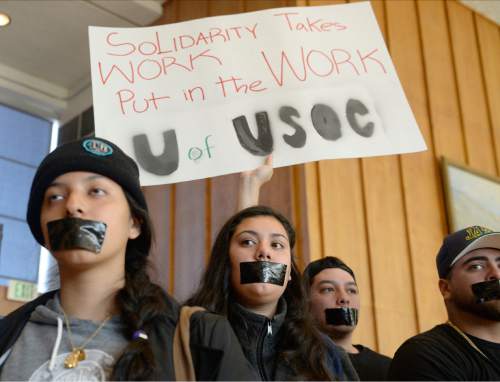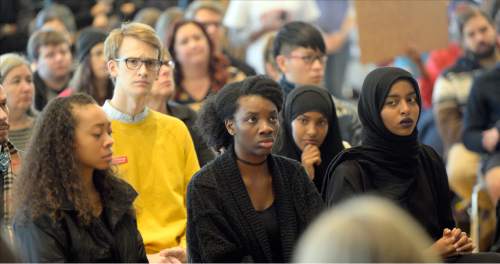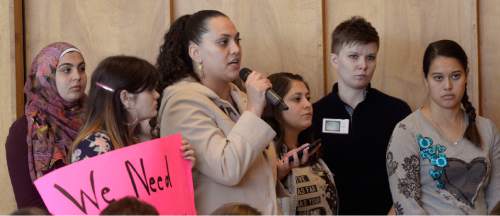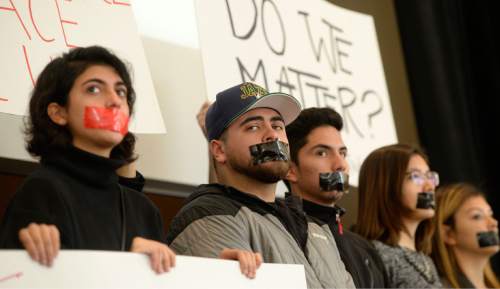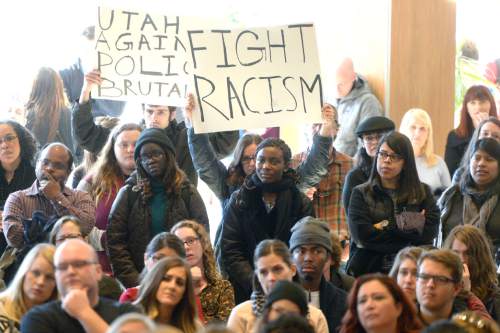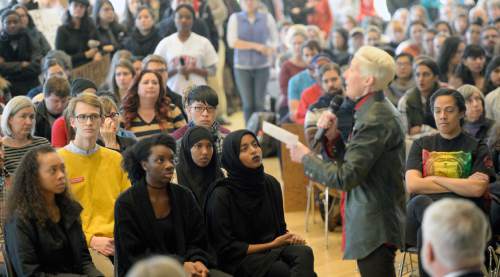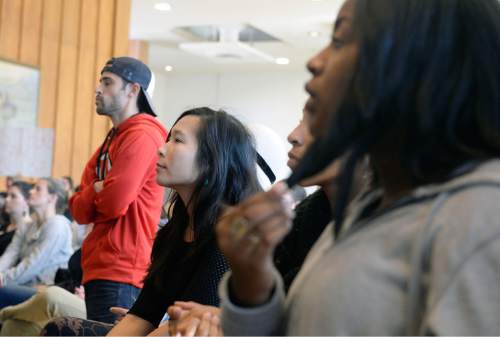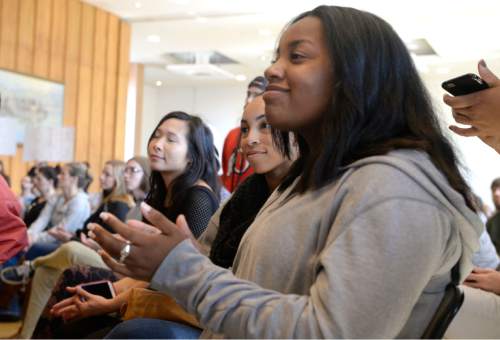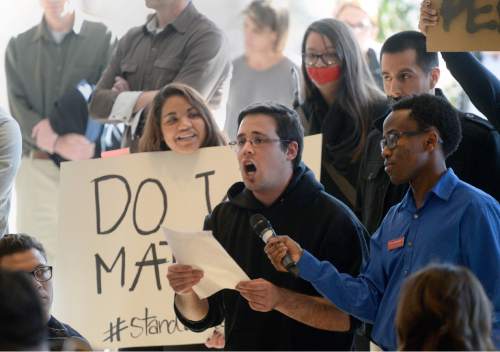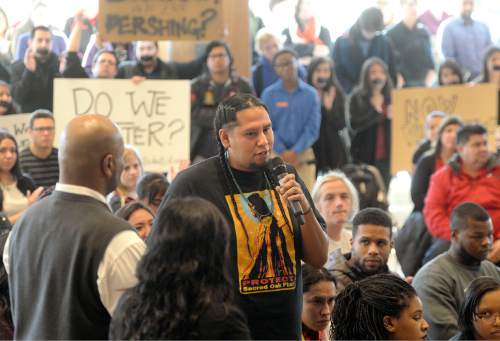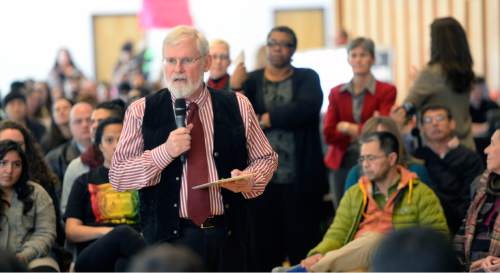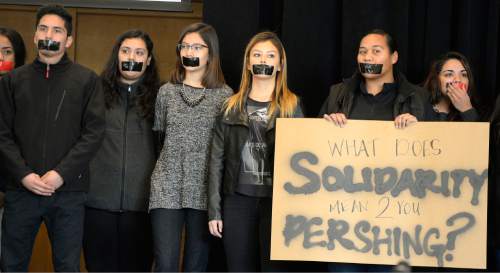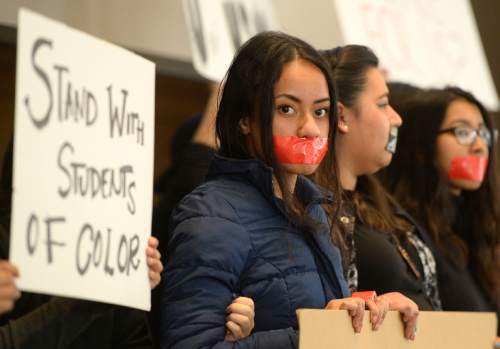Al Hartmann | The Salt Lake Tribune
Students filled the auditorium at Olpin Union building at the University of Utah Friday Nov.
Al Hartmann | The Salt Lake Tribune
Students fill the auditorium at Olpin Union building at the University of Utah Friday Nov. 2
Al Hartmann | The Salt Lake Tribune
University of Utah student Kaya Tukuafu with the group Voices of Diversity speaks to student
Al Hartmann | The Salt Lake Tribune
Students filled the auditorium at Olpin Union building at the University of Utah Friday Nov.
Al Hartmann | The Salt Lake Tribune
Students filled the auditorium at Olpin Union building at the University of Utah on Friday f
Al Hartmann | The Salt Lake Tribune
Students filled the auditorium at Olpin Union building at the University of Utah Friday Nov.
Al Hartmann | The Salt Lake Tribune
Students filled the auditorium at Olpin Union building at the University of Utah Friday Nov.
Al Hartmann | The Salt Lake Tribune
Students filled the auditorium at Olpin Union building at the University of Utah Friday Nov.
Al Hartmann | The Salt Lake Tribune
University of Utah student Ivan Ottaviano speaks to students that filled the auditorium at O
Al Hartmann | The Salt Lake Tribune
University of Utah Native American student Nathan Manuel speaks to students that filled the
Al Hartmann | The Salt Lake Tribune
University of Utah President David Pershing speaks to students that filled the auditorium at
Al Hartmann | The Salt Lake Tribune
Students filled the auditorium at Olpin Union building at the University of Utah Friday Nov.
Al Hartmann | The Salt Lake Tribune
Students fill the auditorium at Olpin Union building at the University of Utah Friday Nov. 2
Al Hartmann | The Salt Lake Tribune
Students filled the auditorium at Olpin Union building at the University of Utah Friday Nov. 20 for an open discussion on the school's attempts at inclusivness and fairness to it's minority students. A handful of minority students in the crowd held a silent protest during the discussion with signs and taped mouths saying the university doesn't do enough to represent them. The protestors were welcome but most students used the time to listen and vocalize their problems with the school's lack of support programs for minority students and what it could do better.
Al Hartmann | The Salt Lake Tribune
Students fill the auditorium at Olpin Union building at the University of Utah Friday Nov. 20 for an open discussion on the school's attempts at inclusivness and fairness to it's minority students. A handful of minority students in the crowd held a silent protest during the discussion with signs and taped mouths saying the university doesn't do enough to represent them. They were welcome but most students used the time to vocalize their problems with the school's lack of support for minority students and what it could do better.
Al Hartmann | The Salt Lake Tribune
University of Utah student Kaya Tukuafu with the group Voices of Diversity speaks to students that filled the auditorium at Olpin Union building at the University of Utah Friday Nov. 20 for an open discussion on the school's attempts at inclusivness and fairness to it's minority students. Students and faculty used the time to listen and air their problems with the school's lack of support programs for minority students and what it could do better.
Al Hartmann | The Salt Lake Tribune
Students filled the auditorium at Olpin Union building at the University of Utah Friday Nov. 20 for an open discussion on the school's attempts at inclusivness and fairness to it's minority students. A handful of minority students in the crowd held a silent protest during the discussion with signs and taped mouths saying the university doesn't do enough to represent them. The protestors were welcome but most students used the time to listen and vocalize their problems with the school's lack of support programs for minority students and what it could do better.
Al Hartmann | The Salt Lake Tribune
Students filled the auditorium at Olpin Union building at the University of Utah on Friday for an open discussion on the school's attempts at inclusivness and fairness to it's minority students. A handful of minority students in the crowd held a silent protest during the discussion with signs and taped mouths saying the university doesn't do enough to represent them. The protestors were welcome but most students used the time to listen and vocalize their problems with the school's lack of support programs for minority students and what it could do better.
Al Hartmann | The Salt Lake Tribune
Students filled the auditorium at Olpin Union building at the University of Utah Friday Nov. 20 for an open discussion on the school's attempts at inclusivness and fairness to it's minority students. A handful of minority students in the crowd held a silent protest during the discussion with signs and taped mouths saying the university doesn't do enough to represent them. The protestors were welcome but most students used the time to listen and vocalize their problems with the school's lack of support programs for minority students and what it could do better.
Al Hartmann | The Salt Lake Tribune
Students filled the auditorium at Olpin Union building at the University of Utah Friday Nov. 20 for an open discussion on the school's attempts at inclusivness and fairness to it's minority students. A handful of minority students in the crowd held a silent protest during the discussion with signs and taped mouths saying the university doesn't do enough to represent them. The protestors were welcome but most students used the time to listen and vocalize their problems with the school's lack of support programs for minority students and what it could do better.
Al Hartmann | The Salt Lake Tribune
Students filled the auditorium at Olpin Union building at the University of Utah Friday Nov. 20 for an open discussion on the school's attempts at inclusivness and fairness to it's minority students. A handful of minority students in the crowd held a silent protest during the discussion with signs and taped mouths saying the university doesn't do enough to represent them. The protestors were welcome but most students used the time to listen and vocalize their problems with the school's lack of support programs for minority students and what it could do better.
Al Hartmann | The Salt Lake Tribune
University of Utah student Ivan Ottaviano speaks to students that filled the auditorium at Olpin Union building at the University of Utah Friday Nov. 20 for an open discussion on the school's attempts at inclusivness and fairness to it's minority students. Students and faculty used the time to listen and air their problems with the school's lack of support programs for minority students and what it could do better.
Al Hartmann | The Salt Lake Tribune
University of Utah Native American student Nathan Manuel speaks to students that filled the auditorium at Olpin Union building at the University of Utah Friday Nov. 20 for an open discussion on the school's attempts at inclusivness and fairness to it's minority students. Students and faculty used the time to listen and air their problems with the school's lack of support programs for minority students and what it could do better.
Al Hartmann | The Salt Lake Tribune
University of Utah President David Pershing speaks to students that filled the auditorium at Olpin Union building at the University of Utah Friday Nov. 20 for an open discussion on the school's attempts at inclusivness and fairness to it's minority students. Students and faculty used the time to listen and air their problems with the school's lack of support programs for minority students and what it could do better.
Al Hartmann | The Salt Lake Tribune
Students filled the auditorium at Olpin Union building at the University of Utah Friday Nov. 20 for an open discussion on the school's attempts at inclusivness and fairness to its minority students. A handful of minority students in the crowd held a silent protest during the discussion with signs and taped mouths saying the university doesn't do enough to represent them. The protestors were welcome but most students used the time to listen and vocalize their problems with the school's lack of support programs for minority students and what it could do better.
Al Hartmann | The Salt Lake Tribune
Students fill the auditorium at Olpin Union building at the University of Utah Friday Nov. 20 for an open discussion on the school's attempts at inclusivness and fairness to it's minority students. A handful of minority students in the crowd held a silent protest during the discussion with signs and taped mouths saying the university doesn't do enough to represent them. The protestors were welcome but most students used the time to listen and vocalize their problems with the school's lack of support programs for minority students and what it could do better.


